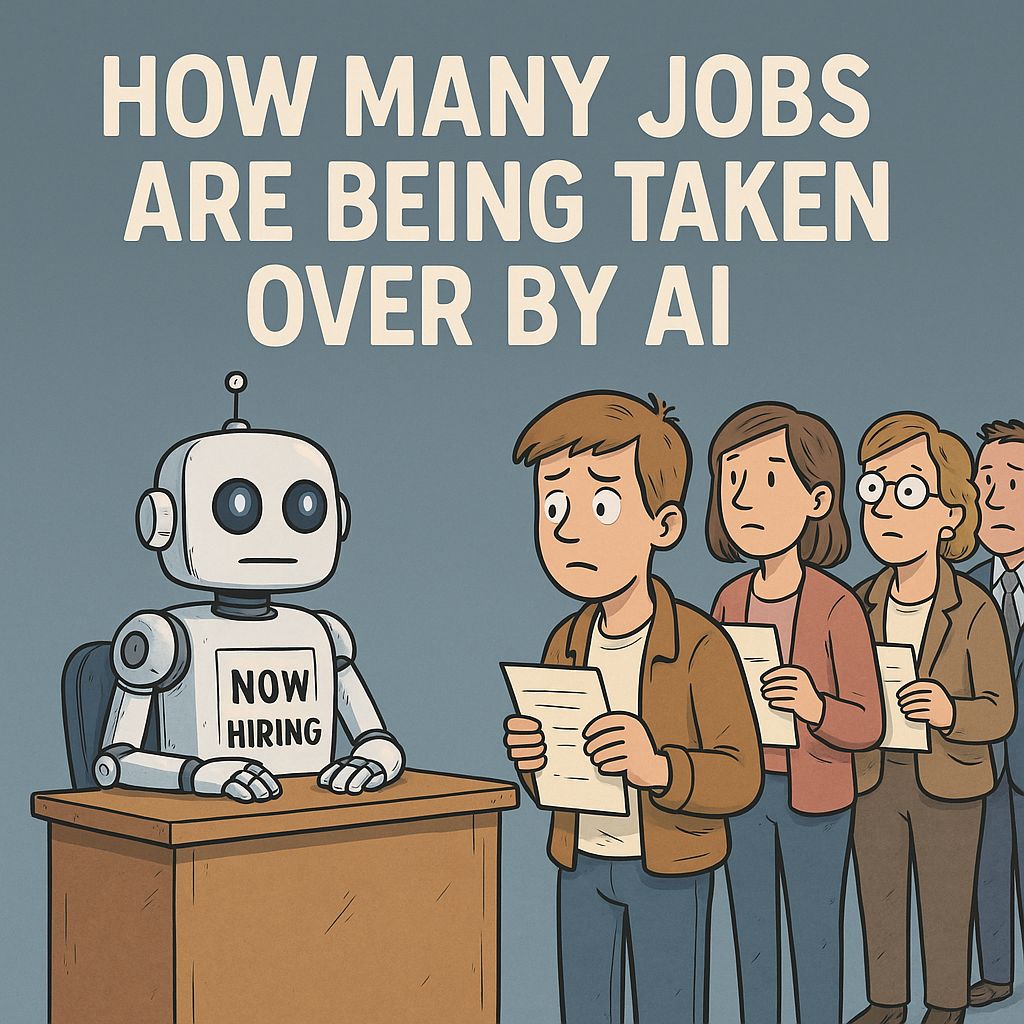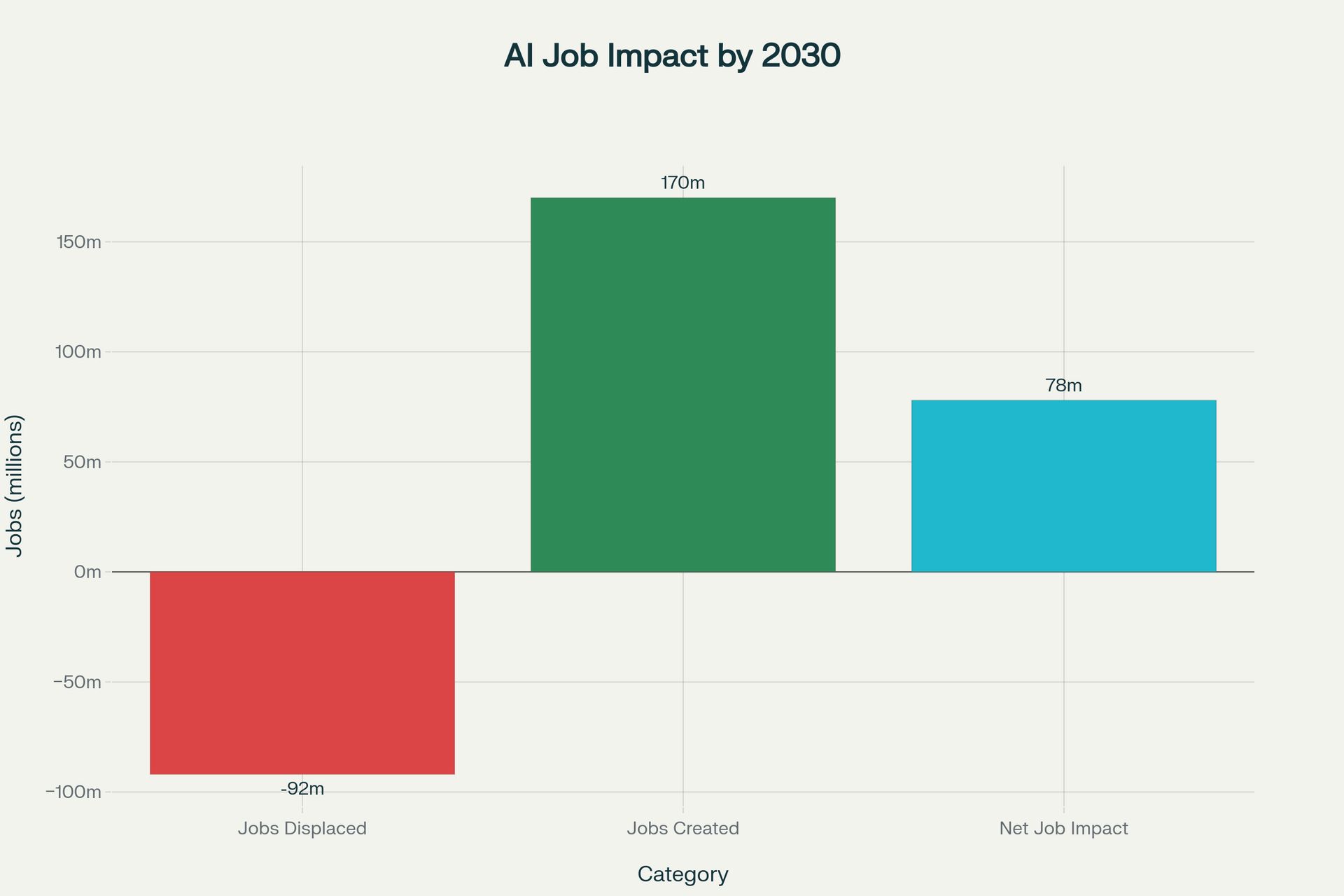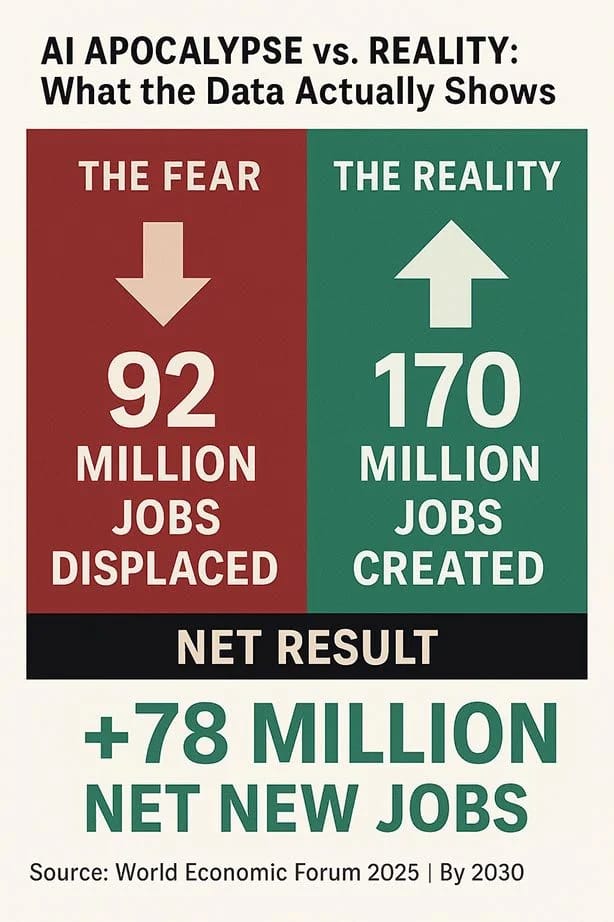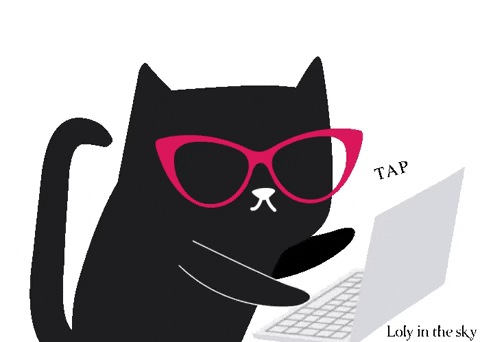- Product Upfront AI
- Posts
- You Have Five Years To Prepare.
You Have Five Years To Prepare.
Here's What That Actually Means.

Sana walked into her manager's office last Thursday with an envelope in her hand.
Twenty-three years with the company. One of their best financial analysts. The person everyone went to when the numbers didn't make sense.
She was quitting.
Not for another job. Not for retirement.
Because she couldn't keep up anymore.
"I spend half my day just trying to understand what the AI is telling me," she told him. "Everyone else seems to get it. I just... I can't."
She was 51 years old. And she felt obsolete.
That conversation has been replaying in her manager's mind ever since.
This Is Happening In Every Office Right Now
92 million jobs will disappear by 2030 because of AI. The World Economic Forum isn't guessing. They're watching it happen in real-time.

But Sana's story isn't about job loss. It's about something worse.
It's about capable, talented people giving up because they don't know how to adapt.
The tragedy isn't that AI is taking jobs. It's that people aren't being prepared for what's coming next.
The Graduates Who Can't Get Hired
Jennifer teaches computer science at a state university.
Last semester, three of her top graduates were still unemployed six months after graduation. Not because they weren't talented. Because companies didn't need junior developers anymore.
One student told her, "I spent four years learning to code. Now ChatGPT can do in 30 seconds what takes me 30 minutes."
Unemployment among 20-30-year-old tech workers has jumped nearly 3 percentage points since early 2024. These students did everything right. They chose a "safe" career. They worked hard.
And the rules changed on them overnight.
Entry-level software engineers face massive disruption. Data entry clerks are watching 7.5 million positions evaporate by 2027. Customer service representatives have an 80% automation risk.
Even financial analysts like Sana, people who spent decades building expertise, are being replaced by algorithms that can process market data faster than any human ever could.
Goldman Sachs estimates that 6 to 7% of all US workers will be replaced by AI within the next decade.
The future arrived early. And for many people, it feels brutal.
But Here's The Part Nobody Sees Coming
While Sana was handing in her resignation, something else was happening across her company.
The HR department couldn't find enough people to fill their new AI-related positions.
AI and Machine Learning Engineers? 82% projected growth over five years. Companies are desperate for these professionals.
Data Scientists who can actually interpret what AI is telling them? Organisations are competing fiercely for their talent.
AI Ethics Specialists? The role didn't exist three years ago. Now it's essential.
One employee just transitioned into a Prompt Engineering role and received a 56% raise. To know how to communicate effectively with AI systems.
A 56% raise for a skill that didn't exist two years ago.
The jobs are there. But they require completely different skills than what most people currently have.
The Real Divide That's Forming
Here's what's happening in workplaces right now.
75% of knowledge workers are already using AI tools. Almost half of them just started in the last six months.
These workers are reporting 66% productivity improvements. They're getting more done. They're more satisfied with their work.
But the other 25%? They're getting left behind. Fast.
People like Sana, brilliant, experienced professionals, are watching younger colleagues race ahead simply because they're comfortable with new technology.
And it's creating two completely different career trajectories.
One group is learning to work with AI. They're becoming more valuable every single day.
The other group is competing against AI. And they're losing.
The Workers Who Will Survive This
Researchers have been studying this question intensely: What can't AI replace?
The answer is actually pretty clear.
Healthcare workers remain secure. Nurses, doctors, surgeons, therapists. AI can assist with diagnosis, but it can't provide human empathy. It can't hold someone's hand when they're scared.
Creative professionals who do original thinking—not those churning out generic content, but those creating truly novel ideas and emotionally resonant work—will thrive.
Skilled trades are virtually untouchable. Electricians, plumbers, HVAC specialists. AI can't navigate a flooded basement or rewire a century-old house. Those jobs require physical presence and real-time problem-solving in unpredictable environments.
Teachers and social workers who inspire and motivate, who read the room, who understand cultural nuance, remain irreplaceable.
Leaders and managers who make ethical decisions and navigate complex human dynamics will always be needed.
The pattern is clear: The jobs AI can't take are the ones that require people to be deeply, essentially human.
What The Smart Ones Are Doing
Marcus was in the same department as Sana. Same age. Same experience level.
But he made a different choice.
When the company announced AI training sessions, he signed up. When younger colleagues used new tools, he asked them to show him how. When he felt lost, he admitted it and asked for help.
Last month, he was promoted to lead the team integrating AI into their financial forecasting systems.
"I felt terrified," he admitted. "I thought I was too old to learn this stuff. But I realised being scared wasn't going to save my job."
70% of workers will need new skills by 2030. That's not optional. That's survival.
The people who are thriving aren't the ones with the most experience. They're the ones who can adapt fastest.
The Four Shifts That Make The Difference
The workers successfully navigating this transition are doing four things differently:
First, they're embracing AI literacy. They're learning to use the tools rather than fearing them. Workers with AI skills are earning 56% more than those without. That number was only 25% last year. The gap is widening fast.
Second, they're doubling down on human skills. Emotional intelligence. Creative problem-solving. Ethical reasoning. Complex communication. These capabilities become more valuable as AI handles routine tasks.
Third, they've adopted a continuous learning mindset. They're not trying to protect what they already know. They're constantly acquiring what they need to know next.
Fourth, they're using AI to enhance their work, not replace their thinking. They automate routine tasks and focus their human energy on strategy, creativity, and relationships.
What This Looks Like Across Industries
In tech: The survivors are moving from basic coding to AI system design, cybersecurity, and human-AI interface development.
In business, successful professionals are learning AI project management, data interpretation, and strategic implementation.
In creative fields, the ones thriving are mastering AI as a collaborative tool while emphasising original human storytelling.
Companies using AI effectively are seeing 3x higher revenue growth per employee. This technology makes businesses more capable, not just more efficient.
And here's the encouraging part: 77% of companies plan to upskill existing employees to work with AI rather than simply replacing them.
They want to transform their workforce, not destroy it.
The Timeline That Matters
Advanced economies are experiencing the impact first. 60% of jobs in developed countries face AI disruption, compared to only 26% in low-income nations.
Why? Because developed economies have more knowledge work. More office jobs. More roles involving screens and data.
By 2030, this transformation reaches critical mass.
That gives people five years to prepare. Five years to position themselves on the right side of this shift.
It might sound like plenty of time. It's not.
Sana's Story Doesn't Have To Be Everyone's Story
Three weeks after Sana quit, she called her former manager.
She'd enrolled in an AI literacy program at the local community college. She was learning Python. She was using ChatGPT to help her understand financial models she used to struggle with.
"I was so angry when I left," she said. "But I realised I wasn't angry at AI. I was angry at myself for giving up."
She's not coming back to her old job. She's found something better—a consulting role helping other finance professionals transition into AI-augmented work.
She's making more money than she ever did before.
"I wish I'd done this two years ago," she told him. "I wasted so much time being scared."
The Real Opportunity Hidden In The Crisis
Yes, 92 million jobs will disappear by 2030.
But 170 million new jobs will be created in the same timeframe.
That's a net gain of 78 million positions. One of the biggest employment booms in modern history.

The question isn't whether there will be jobs. The question is whether people will be ready for them.
The students Jennifer teaches? The ones who can't get junior developer jobs? They're now learning to become AI system architects. To build tools that help humans and AI work together.
Marcus? He's teaching other financial analysts how to leverage AI to do work they never thought possible.
And Sana? She's proof that it's never too late to adapt.
What This Week Needs To Look Like
For anyone reading this who feels like Sana did three weeks ago—scared, overwhelmed, left behind—here's what the next seven days need to include:
Pick one AI tool and actually learn it. Not dabble with it. Learn it properly.
Maybe it's ChatGPT for writing and research. Maybe it's GitHub Copilot for coding. Maybe it's Midjourney for design.
Spend three hours this week becoming genuinely competent with one tool.
Then ask: How can this make me more valuable at what I do? How can this free me up to focus on the work only humans can do?
Because here's the truth that took Sana three weeks to discover:
AI isn't the enemy. Fear is the enemy.
Resistance is the enemy.
Refusing to adapt is the enemy.
The people who will lose their jobs aren't the ones AI replaces. They're the ones who refuse to evolve.
The Generation That Gets To Choose
By 2030, AI adoption will reach critical mass. This technology isn't going away. It's becoming as fundamental as electricity or the internet.
People alive right now get to make a choice that will define the rest of their careers.
They can resist this change and watch opportunities disappear.
Or they can embrace it and discover capabilities they never knew they had.
The future doesn't belong to humans or AI alone.
It belongs to people who figure out how to combine human creativity, empathy, and judgment with artificial intelligence's computational power.
Sana figured it out. Marcus figured it out. Jennifer's students are figuring it out.
The only question is: How many others will figure it out before it's too late?
The jobs are coming. 170 million of them. But they won't wait for people who refuse to prepare.
Before You Go
What's one thing you'll do today without AI help? I'd love to hear about it.
New to AI but curious about what's possible?
Subscribe here for weekly tutorials that actually make sense.
No jargon, no hype, just step-by-step guides you can follow.

Reply